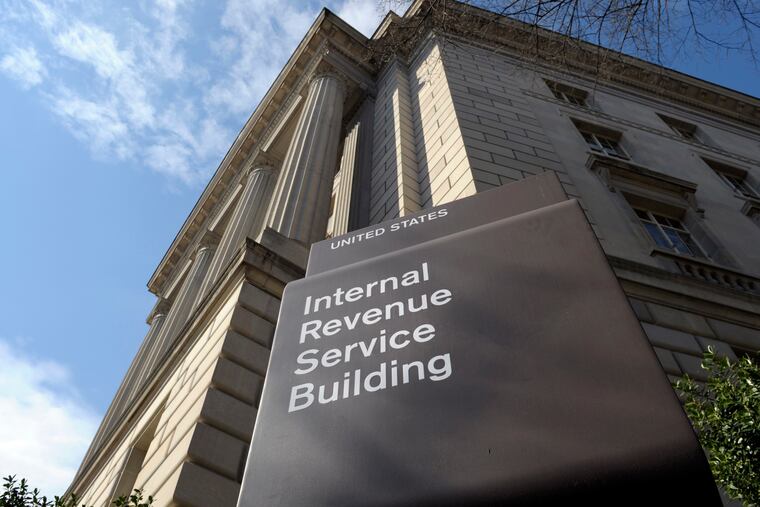Hate the idea of a bigger IRS? Don’t blame the agents. Blame Congress.
There are lots of ways for a government to raise money. Taxing income gives the government a window into your entire life. Other ways are much less intrusive.

The so-called Inflation Reduction Act signed into law by President Joe Biden last week may not actually reduce inflation, but it will certainly have other impacts. The bill, for instance, includes a massive increase in the budget of the Internal Revenue Service.
Many Americans are afraid this will lead to an army of more agents conducting more audits and intruding even more into their financial affairs.
This is concerning. But if it happens, don’t blame the IRS. That’s like being mad at Immigration and Customs Enforcement (ICE) because you don’t like our border policy, or being mad at the traffic cop because you think the speed limit should be higher. IRS employees are the instruments of government policy, not its creators.
I grew up in Northeast Philadelphia, once home to one of the largest IRS service centers in the nation. The IRS workers I knew weren’t nefarious rogues waiting to pounce on your tax return; they were our friends and neighbors. Many of them agree that the tax system is too onerous, too complicated, and generally unfair. But they do a job and do it nonpolitically.
Should you be concerned about an audit? Of course. Even if you’ve done nothing wrong, the ordeal could cost you hundreds of hours of your own time and thousands in accountant or lawyer bills. It’s a horribly intrusive process.
The point of an audit, of course, is to make sure people are paying what the government says they owe. So any discussion of the burden of audits should include the burden of income tax itself. If you hate the idea of the income tax, don’t get mad at the IRS: Blame Congress.
There are lots of ways for a government to raise money. Outside of a brief experiment during the Civil War, this country did not tax people’s incomes until 1913. The government was much smaller then, but it did still manage to fund itself through revenue from tariffs, land sales, and direct taxes on certain goods (like that whiskey tax that some 18th-century Pennsylvanians got so upset about). People disliked those taxes for various reasons, but there has never been a tax people liked, even when they agreed it was necessary.
Once the income tax was enacted, though, two things happened: It rarely stopped growing, and it never got less complicated. The first problem is just the effect of a Congress that refuses to limit spending — the money to pay for all that must come from somewhere. The second, though, is unique to the income tax and is one reason people fear the IRS.
Income taxation gives the government a window into your entire life — or at least anything involving money, which is most things. Even before the latest bill passed, Congress last year gave the IRS the power to monitor all payments of $600 or more.
“When you pay sales tax, no one writes down your name, let alone anything about you.”
Part of that is the nature of income tax itself: It is more intrusive than other taxes. When you pay sales tax, no one writes down your name, let alone anything about you. A tariff on foreign goods gets recorded against the importer — and the government necessarily gets into its business a bit — but by the time that cost is passed on to the consumer, the government is already out of the picture.
Other taxes intrude on privacy somewhat, but only to the extent the government is already involved. A tax on land requires the government to know who owns the land, but it already knows this — any system of land ownership requires it. You pay to register your car every year in this state, but all that tells the commonwealth is that you own a car, not what you do with it.
But the income tax — and its associated taxes on inheritance and gifts — require a level of surveillance that our Founding Fathers would never have accepted from the British crown. Because it was imposed gradually, we almost don’t notice it anymore — except when the prospect of an audit looms.
That massive invasion of privacy is itself a harm. Those who say otherwise are like those who say you should let the cops search your house without a warrant if you have nothing to hide. Much of the time, they may be right, but that does not mean the government should do whatever it wants to you in pursuit of evidence of suspected wrongdoing.
Funding the government through income taxes rather than land taxes or tariffs is a choice, and it is one made not by IRS agents, but by Congress. These other options would have their own problems, but they would, at least, be less invasive and require fewer agents to enforce them. We should consider, moving forward, whether the sacrifice of our privacy is really necessary, and whether a different basis for our tax system is possible.
Adding to the IRS’s budget will mean it is better at enforcing the existing tax laws, but also that it is better at assisting taxpayers when we call it with questions or to fix an error.
How many employees the service has is not the problem — the tax itself is.
Kyle Sammin is editor-at-large at Broad + Liberty. @kylesammin